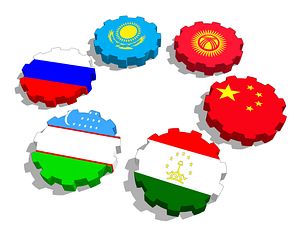Economic cooperation is at the forefront of discussions in Zhengzhou, China between the Prime Ministers and representatives of the Shanghai Cooperation Organization (SCO) member countries. Terrorism, as usual, is also high on the agenda.
The annual SCO heads of government meeting is being hosted by Chinese Prime Minister Li Keqiang. Among the attendees are the Russian, Kazakh, Kyrgyz and Tajik Prime Ministers–Dmitry Medvedev, Karim Massimov, Temir Sariev, and Kokhir Rasulzoda, respectively–and the Uzbek First Deputy Prime Minister, Rustam Azimov. Also in attendance are the Pakistani Prime Minister, Nawaz Sharif, Indian Minister of State for External Affairs, General V K Singh, and Afghanistan’s CEO Abdullah Abdullah, along with representatives from other SCO observers Belarus, Iran, and Mongolia.
Some of the attendees are making the most of their visits to China. Massimov visited Beijing first to settle a few deals, including scoring a $2 billion pledge from China for a investment fund to support “capacity cooperation” with Kazakhstan. Medvedev held bilateral talks to Abdullah in Zhengzhou, ahead of the SCO summit, and after the summit has plans to fly to Beijing to meet with Zhang Dejiang, who chairs the Standing Committee of the National People’s Congress and have a dinner with Li. Medvedev, Sharif, Massimov, Sariyev and Kokhir Rasulzoda, are also scheduled to attend the second World Internet Conference in Wuzhen, China, along with 2,000 participants from 120 countries.
This summer’s SCO heads of state meeting in Ufa, Russia coincided with the BRICS summit and served as a focal point for numerous analyses of the group’s relevance and place in geopolitical affairs. At the summit, the members agreed to grow the organization which has not accepted a new member since Uzbekistan joined in 2001. India and Pakistan are expected to join as full members at the 2016 summit in Tashkent, Uzbekistan. At Ufa, the SCO also considered the possibility of linking China’s Belt and Road initiative to the Eurasian Economic Union in some fashion. But, the summit in Russia this summer dealt in strategies, not implementation.
As Xinhua, points out, the prime minister’s meeting is the forum that focuses on the “implementation of the trade, exchange and security cooperation goals made at the summit.”
In an interview with TASS, the SCO Secretary General, Dmitry Mezentsev, hailed the group’s growth, saying “The potential of cooperation is acknowledged, and this is proved as the SCO is a multi-faceted international association and in fact confirms its unique character and has great prospects for the further development.”
Going further, Mezentsev told TASS that “We cannot but take an interest today in Chinese President Xi Jinping’s initiative on the creation of the Silk Road Economic, supplemented by the Chinese maritime component.” He went on to say that the SCO could be the format through which the Belt and Road initiative linked up with the EEU.
Possibly toward that end, Xinhua reported that according to vice foreign minister Cheng Guoping the SCO members are set to sign a deal that would smooth customs between members in order to promote trade.
On the terrorism front, at the Ufa summit Russian President Vladimir Putin very clearly stated that ISIS is a threat to the member countries, commenting that “We agreed to bolster coordination between our defence ministries to monitor the situation more effectively and coordinate joint action to prevent potential threats.”
Perhaps, after the heads of government meeting, we’ll have an idea of how the SCO plans on actually increasing trade within the member countries and keeping terrorists out of them.

































